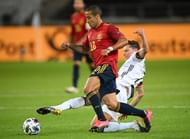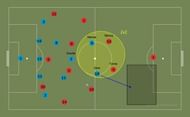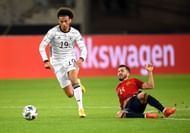#3 Spain's fluidity in midfield

Fabián Ruiz, Thiago and Sergio Busquets were brilliant at positional play in midfield, often interchanging positions and finding space in between the lines of Germany's three-man defence and midfield.
Despite Germany setting up in a 5-4-1 midblock after Timo Werner's opener, Spain was able to play the ball through the wide areas, creating an overload on both sides of the pitch whenever the ball was played, with Robin Gosens and Thilo Kehrer often being the victims of a numerical disadvantage. The game was there to be won for both sides, and Spain were looking like the favourites to bag the three points.
The equaliser was a result of Thiago's brilliant vision to spot Ferran Torres making a late run into the right wide spaces. The 20-year-old received the pass and played an immaculate cross to find Rodrigo in the box, who's header was guided by Gaya for the equaliser.
Luis Enrique would be happy to continue with the same personnel in midfield going deeper into the competition, with quality options in Rodri, Dani Olmo and Diego Llorente on the bench.
#2 Germany's effective partnership of Leroy Sane and Timo Werner

Germany played a 3-5-2 on paper, which was more of a 3-4-1-2, with Julian Draxler operating at the tip of the midfield while Timo Werner and Leroy Sane played ahead of him, making the in-behind runs during transitions. Spain dominated 60% of the possession which meant they were always open to counter attacks by a pacy front two set up by Joachim Low.
Sergio Ramos and Pau Torres had a tough night keeping the duo quiet. Nearly 40% of Germany's attack came through the middle, as either Werner or Sane, were often spotted latching upon through balls right through the centre of Spain's set-up. Spain's defence were caught 1v1 numerous times but Germany failed to capitalise on several occasions.
Thiago Alcantara often took the auxiliary left-back role to stretch Germany's first line of press and build from the deep. This, however, led to Spain's midfielders getting caught up high up the pitch at times, which opened up spaces in the middle of the pitch for Germany. It was not punished as much as Low would have wanted, but that's a flaw of a very fluid midfield.
#1 Germany relied on pace while Spain succeeded through wing play

Spain had natural width in the wide areas as Ferran Torres and Jesus Navas were chosen by Luis Enrique to run the proceedings. Meanwhile, Robin Gosens and Thilo Kehrer, Germany's wing-backs, were the ones providing width for the home side. In a very open 90 minutes, both the teams were tested to the tee defensively, and a point apiece was only fair.
The Spaniards attempted 20 crosses throughout the game, while Germany had 7. Ferran Torres was Spain's brightest prospect going forward and pretty much ran the game offensively for the side. The equaliser also came courtesy of his inch-perfect cross.
On the other hand, Julian Draxler was given the creativity burden to supply Germany's marksmen upfront. As Kai Havertz was benched, Draxler, with the help of Toni Kroos and İlkay Gündoğan, did a decent job at playing the No.10 role.
Serge Gnabry was obviously a huge miss for Germany and his three defensive substitutions made it easier for Spain to commit bodies forward in search of a goal.
The UEFA Nations League concept has definitely changed the way fans and players consider international games. Rather than treating the games as friendlies, the teams have more intensity and a greater will to win matches.
